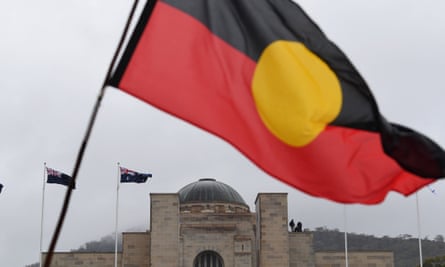Calls grow for Australia's frontier wars to be remembered on Anzac ...
When Gimuy Walaburra Yidinji elder Theresa Dewar lays a wreath at the Cairns cenotaph on Tuesday, it will be to remember a conflict that took place well before Gallipoli.
For the seventh year in a row Dewar and fellow traditional owners will use the occasion of Anzac Day to remember those killed in Australia’s frontier wars.
“It is very important for us to meet on that day to remember what went on in the war that was in this country first,” Dewar says. “It involved our ancestors, it involved the early settlers, and it was on both sides.”
A separate memorial event the group holds on the eve of Anzac Day has continued to grow each year, according to Dewar’s sister and fellow elder, Elaine Thomas.
“They were the forgotten people … but these [memorial] events are appearing all over Australia now,” Thomas said.
“We’ve got Indigenous and non-Indigenous people gathering with us, and they’re getting more understanding of what we’ve been saying for years – it happened here, and it happened across our region.”
While the new chair of the Australian War Memorial, Kim Beazley, has said he would like to see “proper recognition of the frontier conflict” as part of the institution’s $500m expansion, the Returned Servicemen League (RSL) is against incorporating the frontier wars in Anzac Day services.
A spokesperson for the RSL said that while it considers “the establishment of a commemoration or memorials to mark those killed in precolonial conflicts as appropriate”, Anzac Day and the Australian War Memorial should be reserved for honouring those who have served the country in conflicts since federation.
Sign up for Guardian Australia’s free morning and afternoon email newsletters for your daily news roundup
“Pre-colonial conflicts involving Indigenous Australians are a different matter that, although a significant part of Australia’s history, would be more appropriately told in the National Museum or the Ngurra Cultural Precinct,” the statement said.
Michael Ghillar Anderson, a Euahlayi activist from Goodooga, New South Wales, is the last surviving of the four original men who set up the Aboriginal tent embassy on the lawns of parliament house in Canberra in 1972.
Anderson has been marching on Anzac Day in the ACT to commemorate the frontier wars for the past 12 years.
“We were all very, very worried about the reception we would get, but we got a standing ovation, everybody clapped and everybody was crying, and it has grown from then.”

Acknowledging Anzac Day as a solemn time of remembrance, Anderson says there is no better time to focus on “the true history of this country”.
“I think it’s essential that the frontier wars are formally recognised and commemorated as part of Anzac Day. If we are going to reconcile this country, the good and bad, we need to make these changes and acknowledge these wrongdoings.”
skip past newsletter promotionafter newsletter promotion
Prof Greg Lehman, the pro vice-chancellor of Aboriginal leadership at the University of Tasmania, is descended from the Trawulwuy people of the state’s north-east. He said a national conversation on the frontier wars was long overdue, but how they are commemorated should be deeply considered.
“The frontier wars were so different, so distinct; these were the defining wars, the foundation of the beginnings of the Australian nation.
“There is a valid proposition that Anzac Day is already something different to what it originally was, in that it embraces all service people, no matter what conflict they’ve been involved with, so to extend that to the frontier wars is definitely something that could happen.”
However Leman is concerned that if “we just tuck the frontier wars in there and they get a mention, like the obligatory acknowledgment of country, it will be meaningless, it’s tokenistic.”
“I’d hate to see the frontier wars just thrown in when they read out the list of conflicts, because it’s actually profoundly much different and much more significant than any of those individual conflicts.”
For Neville Reys, a fellow Gimuy Walaburra Yidinji traditional owner the frontier wars share a lot in common with other conflicts remembered on 25 April.
To him the frontier wars represent “the horrific trauma, scarring, mental issues, physical issues, the displacements, dispossession, everything that has occurred to Indigenous people, which was tenfold within a war situation”.
“This is the same outcome that would exist in any war,” he said. “Whether it’s Gallipoli, Afghanistan, anywhere, anytime, it’s all exactly the same.
“While we are walking towards this whole truth process, I think the frontier wars have to be recognised on Anzac Day.”



























































